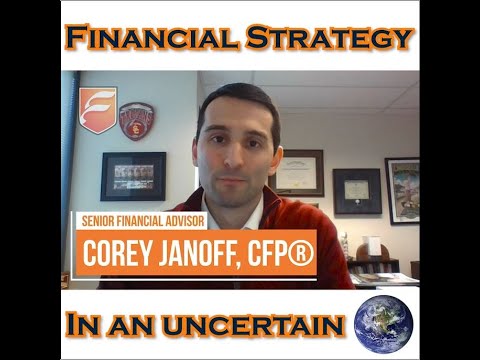Written by: Corey Janoff
We live in a crazy time, filled with uncertainty. Between volatile markets, geopolitical tension, coronavirus, trade wars, and 24/7 news cycles highlighting everything bad in the world, it’s hard to make sense of it all. So how the heck are we supposed to create a financial strategy with all the noise going on around us?
Financial planning is a big guessing game. I’m not saying that to discredit the importance or benefit of it. Far from it. I’m saying that to remind you that your financial strategy is really an educated guess based on the information you have available. Because it’s a guess, don’t worry about perfection. It will be imperfect.
Case in point, let’s say you are planning for retirement. You are 35 years old today and you want to have the ability to retire from your career by age 60. How much do you need to save each month and how should you go about investing that money?
In order to make those calculations, we need to first make several guesses. We must guess how long you might live. We need to guess what your future income trajectory will be. We must guess what your future expenses will be, which requires us to estimate what inflation will be like moving forward. We need to take a guess on what taxes will be like over time. We have to estimate a reasonable rate of return on your investments. Will we have a period of good returns or poor returns in the years leading up to your target retirement goal? Your guess is as good as mine. We have to gauge how comfortable you are with various investment risks and invest accordingly (hard to know until you actually experience a big market correction).
Once we have all those guesses written down, we can plug that into a program to tell us how much we need to save starting now in order to retire by age 60. Making a minor change to any of these variables could drastically impact your required savings rate. The further you are from the desired goal, the wider the range of possible outcomes.
If this happens, we need to save this much. If that happens, we need to save that much. If your aunt dies and bequeaths you $1,000,000, you don’t need to save nearly as much! If we’re not careful, this can lead to paralysis by analysis.
So many possibilities! It’s like trying to order off the menu at Cheesecake Factory. How do you possibly decide what to get?! Do you get the pasta carbonara with a Brussels sprout and kale salad, or carne asada steak with some tiramisu for dessert? Or maybe a chicken salad sandwich with some avocado eggrolls to start? What is going to make your belly the happiest? You eventually must pick an option and run with it. It may not be perfect, but it will get the job done.
Did I really just equate financial planning to ordering dinner at Cheesecake Factory?

No Strategy is Perfect
Life isn’t perfect. We all have bad days at work. Sometimes it rains when you are on vacation. Things don’t always go the way we want them to go.
Same goes for your personal finances and investments. Unexpected things happen that cost you money. Your air conditioner breaks. You need to hire a plumber to fix a broken toilet. You get in a car accident. Your employer needs to cut costs and you get laid off at work. Hopefully you have more positive days than negative ones. I think most people do.
Your investments are no different. They won’t always go up. Some days they will increase in value. Some days they will go down in value. Some years you will see considerable increases in your investment portfolios. Some years you will see losses. Historically we have seen more good years than bad (about 3 to 1). It’s not going to be perfect though. In order to realize the good times, you have to endure the bad.
The Aaron Rodgers Analogy
One of my mentors has a good analogy when it comes to creating a financial or investment strategy. He calls it the Aaron Rodgers analogy (he’s from Wisconsin and most of his clients are in Wisconsin). Whether you are a Green Bay Packers fan or not, most people will agree that Aaron Rodgers is a pretty good quarterback.
He’ll be reviewing an investment portfolio or discussing an investment strategy with a client and shift the conversation to talk about the Packers. He’ll say, “I have a great idea for the Packers. How about they only play Aaron Rodgers on the plays where he throws for a completion or a touchdown and they sub him out for plays where he would throw an incompletion or interception.”
We all know this is silly. We don’t know ahead of time which downs will result in positive plays for the Packers and which ones will result in negative plays. One thing we do know is that up to this point in his career, Aaron Rodgers has a lot of talent. Throughout the course of a game and a season, he is likely to make more good plays than bad plays and the Packers have better odds of winning when he plays than when he doesn’t.
Therefore, the Packers and their fans are willing to accept the negative plays and occasional losses for the opportunity that Aaron Rodgers gives them to win. They know he won’t throw a completion every play. They know he won’t lead them to victory every game. But the probability of achieving their long-term goals (making the playoffs, winning the division, going to the Super Bowl, etc.) are greater when Rodgers plays.
In order to realize all of the potential, we have to accept the negative events that go along with it. It’s impossible to only have good things happen and strategically avoid bad things.
There are ways to try to tilt the odds in your favor. Playing Aaron Rodgers for the whole game likely gives you more good plays than bad. Obeying traffic laws increases your odds of getting to your destination safely.
Staying invested instead of trying to time the market ensures you will realize all of the good days the market delivers. If we sit out for the days/weeks/months that we don’t think will go well, sure we might avoid some market pullbacks, but we are guaranteed to miss out on all of the gains that occur during that period of time.
Design Your Financial Strategy for Your Goals
When creating a financial or investment strategy, it needs to be focused around your goals. The “why” behind all of it. That will help keep things in perspective.
Why are you saving $3,000/month for retirement? So I can retire by <insert age here>.
Why are you investing in a 70% stock, 30% bond portfolio? Because based on my comfort level with investment risk and the amount I am saving, that gives me the best odds of achieving my goal with the least amount of risk possible.
Once you have your strategy in place, you know it won’t be perfect, but it’s important to stick with it in order to realize all of the potential benefits. If your 70/30 portfolio goes down 10% in a month, that doesn’t mean it’s a bad portfolio and needs to be discarded. The Packers aren’t going to bench Aaron Rodgers after he throws an interception. It happens. Get over it. Move on.
Even though we need to stick with our overall strategy in order to realize all of the benefits, we still need to review it periodically to make sure we are still on track and update it if needed.
Remember, the strategy isn’t going to be perfect. Maybe your goals change. Maybe some of those variables you based your financial strategy around are different than you originally assumed.
Maybe in the middle part of your career, the investment returns you realized are greater than you anticipated, and you can afford to make your portfolio a little more conservative. Maybe you earned more income than you expected and were able to save up more than you originally planned. Expenses could be greater than you thought, and you might have to shift the timeline for some of your goals.
Again, it’s impossible to predict every variable with accuracy, so it’s still imperative to review and revise along the way. Review & revise is different than complete overhaul the moment adversity strikes. The point is, there is a difference between making some adjustments at halftime and benching your future hall-of-fame quarterback because he had a few bad plays.
If you were confident last month that you had a good strategy for achieving your financial goals, odds are it is still a good strategy this month. And it will likely still will be a good strategy next month.
Stick with it. It’s not going to work out perfectly. Make some minor adjustments along the way if necessary. And enjoy this ride called life.




